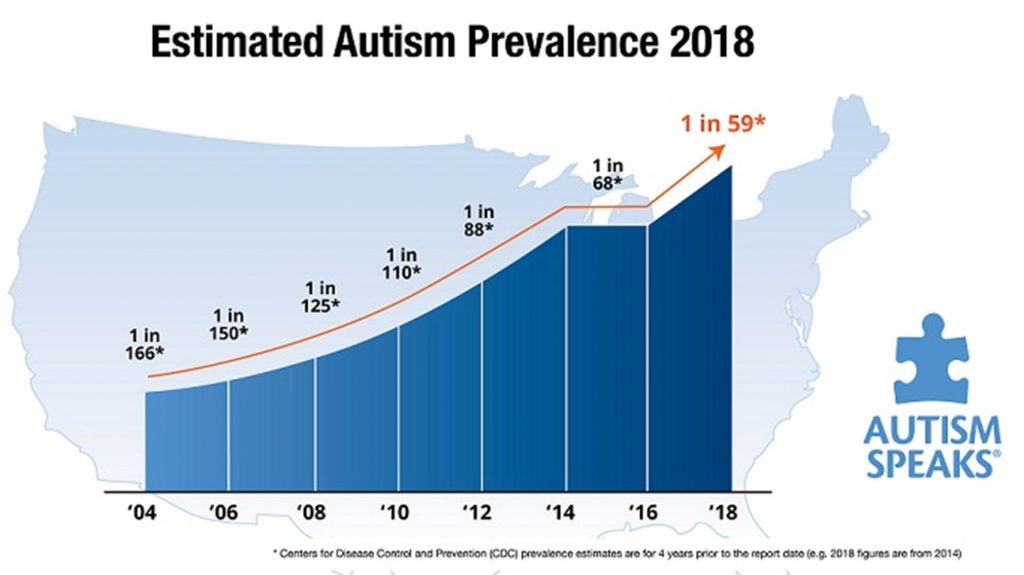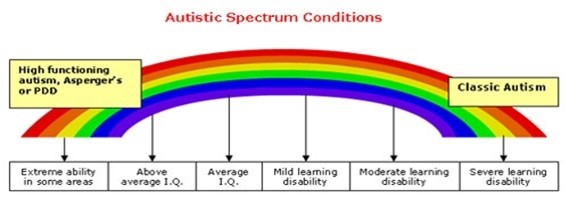The prevalence of autism is on the rise in the US. Because the condition first manifests itself before the age of 3, the majority of people receiving new diagnoses are under the age of 6. Autism spectrum disorder (ASD) refers to a broad range of behavioral conditions that include challenges with social skills, speech, and nonverbal communication as well as repetitive behaviors. The Centers for Disease Control and Prevention (CDC) now estimate that autism affects 1 in 59 children in the United States. That number has been steadily increasing in the past decade.

Autism is a very plural condition as there are many subtypes, primarily influenced by environmental and genetic factors, and has varying degrees of severity. Individuals coping with autism have distinct sets of strengths and challenges. That is why people are characterized as being on an autism spectrum because the individual scale of learning, thinking and problem-solving skills can range from highly skilled to severely challenged. Some who are diagnosed with autism spectrum disorder (ASD) may be able to live entirely independently while others may require some significant support in their daily lives.
Federal and state programs help assist families with children and young adults who have ASD. The Individuals with Disabilities Education Act (IDEA) federal law outlines rights and regulations for US students who require special education. The US Department of Education website outlines the basics of IDEA in simple terms. Are these services available until the young adult reaches the age of 22 and then what? There is a vast continuum of diagnosed and undiagnosed adults who are struggling to make sense of life while living with ASD.
Autism Speaks is an organization that calls on legislators and public health agencies like the National Institute of Health to promote research and advancements in understanding the increased prevalence of and complex medical needs that often accompany a person with autism. There has recently been a call to double the budget to advance research and create policies that better provide individual support and services as autistic children transition to adulthood and need employment and residential options.
For people afflicted, autism is a lifelong condition and there is an unacceptable gap in our awareness of their needs particularly as children age out of federal school programs at 22 and are left to struggle with areas of basic life skills such as employment, housing, and social inclusion. Children with autism eventually become adults with autism. While some autistic adults become very successful, even famous for their success in arts and sciences (Albert Einstein, Dan Aykroyd, and others) others languish in their inability to navigate a complex world.

www.quora.com/Is-there-a-good-visual-map-or-chart-showing-the-ASD-spectrum
Wherever an adult finds themselves in the autism spectrum, there are specific basic needs which mirror those adults without the challenge of ASD, and they are friendship, support, and opportunity. The mechanisms and interpretation of communication may differ but the human need is the same. Reliance on tax-funded programs is not always the best way to approach the needs to sustain them as funding and programs come and go. The real solution to meet the needs of adults with autism is essentially the same as the needs of children with autism. People in their families and communities must help their autistic loved one to make sense of and live in a complex world. The collective belief that they have abilities and strengths are can help reduce their anxieties. Accommodating support in ASD sufferer’s efforts to meet challenges and their own special needs can go a long way in assisting them to live more independent and successful lives.
Are federal and state programs available? Are there community outreach programs that help young adults transition to independent living past the age of 22? Adults with autism differ from one another just as it is for children on the spectrum.
If you have questions or would like to discuss your particular situation, please don’t hesitate to reach out. If you have questions or would like to discuss your personal situation, please don’t hesitate to reach out. Contact our Albuquerque office at (505) 830-0202.

